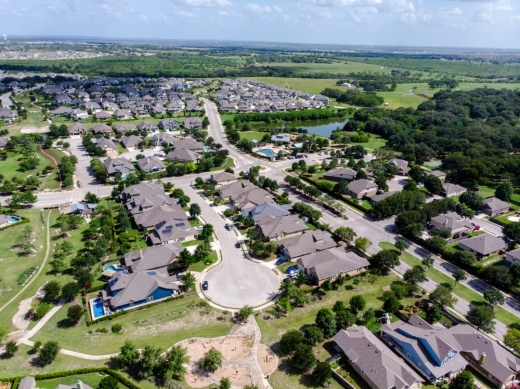With Texas’s status as a state without income tax, local governments and other taxing entities rely on property tax collection for services, according to the Texas Comptroller. Property tax is measured by the value of a property, with governing bodies of each taxing entity determining rates on an annual basis. Local taxes go toward everything from schools and roads to hospitals and fire departments.
The Northeast San Antonio area’s property values have increased by varying amounts. In Schertz, the median property tax increased by 32.95% from 2013 to 2023.
Rising values mean a greater tax bill for area homeowners; however, this number can be alleviated through state legislation and the home appraisal protest process.
The big picture
Property values in Northeast San Antonio cities have fluctuated over the past five years, but are mainly on a slight upward trend. Fred Wulff, a realtor with RE/MAX Corridor in Schertz, said a rise in value specifically took place during the COVID-19 pandemic.

“A lot of people transitioned from working in an office to working in a home, so that caused a rise in the need for homes, and then of course, when there’s a short supply, that means prices go up,” Wulff said.
Wulff said Bexar County residents are hit with higher rates than homeowners in Guadalupe and Comal counties. Bexar County’s 2024 tax rate was $0.276235 per $100 valuation, compared to $0.2627 in Guadalupe and $0.264230 in Comal.
What residents should know
Selma City Administrator Johnny Casias said property taxes go toward various city projects.
“A portion of our property tax goes towards the general fund, the other portion of our property tax goes towards debt service. Debt service is basically long-term debt that the city issues to fund a variety of projects, so for us it’s been water system improvements, buildings like our police department, some road improvements,” Casias said.
What’s new?
In November, Texans will vote on three amendments after Gov. Greg Abbott signed them into law on June 16. Senate Bill 4 would raise the homestead exemption on taxes levied by public schools from $100,000 to $140,000.
A homestead exemption, according to the Texas Comptroller, exempts a portion of a home’s value from taxation. The exemption has been raised from $15,000 to $100,000 in the past decade. Comal County Taxpayer Liaison Officer Kurt Andersen said homeowners can benefit from a homestead exemption if they apply for it through the appraisal district.
“Many times we’ve run into people who have been living in their homes for many many years and have never put in for a homestead exemption, which could have saved them a whole lot of money,” Andersen said.

Abbott said the bills tackling exemptions were one of his legislative priorities.
“A lot of Texans are facing an affordability crisis. Last session, we slashed your property taxes. But for many Texans, those were wiped out by local taxing authorities that hiked your property taxes even more. That must end this session,” Abbott told Community Impact. SB 23 would give homeowners 65 and older, or disabled, a $200,000 exemption on taxes levied by public schools. House Bill 9 exempts up to $125,000 of a business’s personal property.
Keep in mind
One way homeowners can change their tax bill is to protest a property appraisal.
Protests can be initiated online, by mail or through a dropbox in Guadalupe, Bexar and Comal counties. In 2024, a total of 185,780 protests were submitted in Bexar County, with 26,208 submitted in Comal and 25,133 submitted in Guadalupe. As of press time, the number of homeowners who protested this year’s May 15 deadline was not available.
If an informal resolution with an appraisal district cannot be reached, an appraisal review board will hear a protest.
The comptroller website states that an individual or a representative, as well as an appraisal district representative, has the opportunity to present evidence contesting a property value. Examples of evidence include property photographs, receipts or estimates for repairs and sales price documentation.
The comptroller website states that presenting evidence and arguing a case should not get personal, as neither the appraisal review board nor appraisal district set an individual’s property taxes. If an individual is not satisfied with the appraisal review board’s findings, the decision can be appealed to the state district court.
The petition to review with the district court should be made within 60 days of receiving an appraisal review board written order, and an individual may ask the district court to have an appeal resolved through arbitration, a jury, a judge or a settlement.
Guadalupe County Chief Appraiser Peter Snaddon said another thing to keep in mind is Texas’ status as a non-disclosure state, meaning the sale price of a property does not need to be disclosed to any government agency. Property owners typically seek out local real estate agents to obtain market sales for support of their opinion of value he said.
Next steps
Each year follows a similar schedule, beginning with appraisals through April followed by the protest process.





